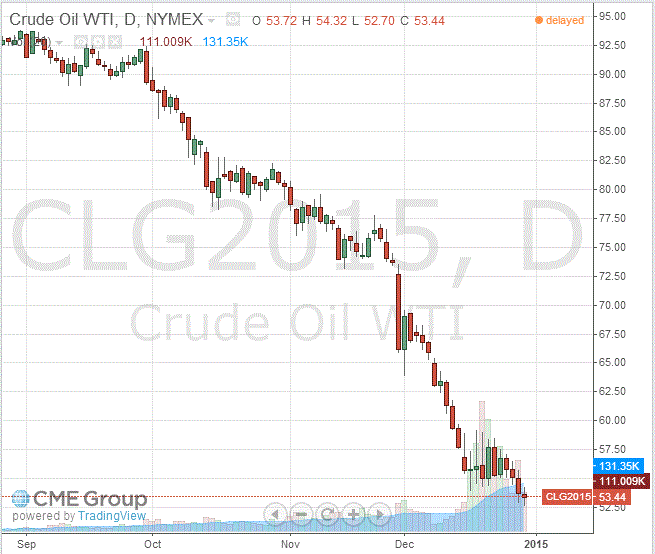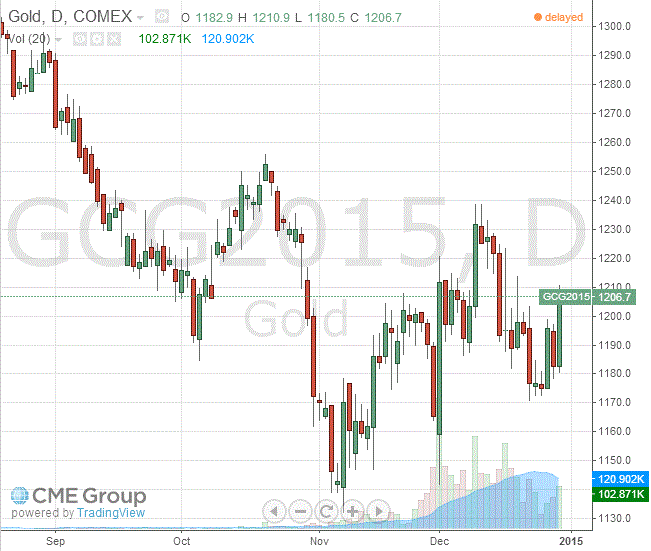Notícias do Mercado
-
16:40
Oil: a review of the market situation
Brent prices fell today, while reaching the minimum value over the past 5.5 years, as concerns about excess supply outweighed fears caused by the suspension of oil production in Libya, which produces 128,000 barrels per day. Prices for WTI, meanwhile, fell below $ 54 a barrel.
Falling prices also associated with the information on the opening of new oil fields in the United States. Market participants expect additional revenues of oil from these fields, as well as the Gulf of Mexico. Experts believe that the oil supply in 2015 will exceed the demand for it, as with OPEC no signs of decreasing production volumes. In the short term solve the problem fail, analysts say. While Saudi Arabia and other leading OPEC members do not take action to reduce the quotas, the situation in the commodities market will remain difficult. Earlier, Venezuelan President Nicolas Maduro called the drop in oil prices by the war, which the United States waged against Russia and his country, trying to bring them to the economic collapse.
The fall in prices is constrained by the expectations of the publication of data on oil reserves in the United States. The American Petroleum Institute will publish data tonight and the US Energy Information Administration - on Wednesday. Investors fear the conservation of commercial oil reserves in the United States at a high level, which could lead to a glut of oil market. Analysts expect the US Department of Energy reported a decrease in stocks of 867 thousand barrels. The volume of oil reserves for the week ending December 19 increased by 7.3 million barrels - up to 387.2 million barrels. "At the moment there is nowhere more obvious signs of growth saturation than in the United States," - said an analyst at JBC Energy GmbH David Uech. He predicts the decrease in production refinery in the first quarter of 2015 around the world that emphasize the more imminent easing of world oil balance.
The cost of the February futures on US light crude oil WTI (Light Sweet Crude Oil) dropped to 53.69 dollars per barrel on the New York Mercantile Exchange.
February futures price for North Sea Brent crude oil mix fell $ 0.56 to $ 57.42 a barrel on the London Stock Exchange ICE Futures Europe.
-
16:20
Gold: a review of the market situation
Gold prices rose significantly today, breaking the level of $ 1,200 per ounce, which was associated with the weakening of the US dollar and the decline in the stock market. Experts note that trading volumes are expected to remain lowered this week in connection with the celebration of the New Year.
The dollar index, which tracks the performance of the greenback against a basket of six major currencies, traded unchanged at 90.55, near a nine-year high 90.66.
The demand for shelter strengthened after Greek Prime Minister Antonis Samaras said that he would recommend that the parliamentary elections were held on January 25, almost 18 months before the expiry of the coalition. The announcement came after Samaras suffered a third failed attempt to convince lawmakers to support his candidacy for the presidency, which must now lead to the dissolution of the legislature.
Traders said the rise in gold prices also helps strengthen the tensions between Russia and the West. Russia's Foreign Ministry said on Tuesday that the expansion of US sanctions against Moscow this week may prevent bilateral cooperation on a range of issues.
Support prices have had some physical buying in China. Prize in Shanghai stored at about $ 4 per ounce.
Since the early years, the price of gold fell by about 1 percent, hurt by a strong dollar and expectations of rising interest rates the Fed. Recall that in 2013 the price of the precious metal fell by 28%, as investor demand waned with the improvement of the US economy and the growth of stock indices.
The cost of the February gold futures on the COMEX today rose by $ 25.0 to 1206.70 dollars per ounce.
-
11:30
Oil: Prices drop to new 5 ½ year lows
Brent crude and West Texas Intermediate are trading lower today hitting new lows. WTI slid to USD52.70 in today's trading, the lowest since May 2009 and Crude traded at 5-1/2-year lows as U.S. stockpiles are projected to remain at 387 million barrel, the highest for the period since 1982 and a global supply glut overweighs worries about Libya's supply problems.
Oil has slumped about 22 percent since OPEC decided against cutting its production target last month in a fight for market share against U.S. shale drillers. Prices have tumbled almost by 46% this year, the largest annual decline since 2008, amid surging production and slower-than-expected demand growth. Output in the U.S. is the highest in three decades.
Brent Crude declined by -0.74%, currently trading at USD57.45 a barrel. West Texas Intermediate lost -0.65% currently quoted at USD53.26.
-
11:00
Gold recovers amid political turmoil in Greece
Gold prices recouped after yesterday's losses as a retreat in stocks, falling oil prices and a weaker dollar revived demand for the precious metal. Worries about the consequences of snap elections taking place in Greece in January further supported prices. Yesterday Greece's Prime Minister Samaras failed in the third and final attempt to have his presidential candidate elected by the Greek parliament.
At the moment gold is down 1.5% for the year 2014. A strong U.S. dollar fuelled by solid U.S. data, a rally in stock markets and expectations on a benchmark interest rate hike by the FED weighed on the metal. Higher U.S. interest rates would boost the greenback and would have an impact on the dollar-denominated metal as it becomes more expensive for holders of other currencies.
Trading volumes are expected to be low this week ahead of the new year's holiday which could lead to volatile and erratic markets. The precious metal is currently quoted at USD1,187.00, +0,26% a troy ounce.
GOLD currently trading at USD1,187.00
-
09:20
Press Review: Samaras Has Four Weeks to Trump Syriza on Greek Economy
REUTERS
Mysterious FX cycle may challenge yen bears in 2015
Dec 30 (Reuters) - Yen bears betting that the Japanese currency will keep declining for a few more years could be wrong-footed based on a mysterious 8-year pricing cycle that has proved accurate over the past four decades.
That cycle calls for a long-term high in the dollar against the yen in 2015. That would run counter to the view of many currency specialists who expect the dollar, which hit a 7-1/2 year high against the yen this month, to keep rising beyond 2015.
Since the introduction of a floating rate exchange system in 1973, the dollar has peaked against the yen every eight years with clockwork precision.
Source: http://www.reuters.com/article/2014/12/29/markets-forex-yen-idUSL3N0UA1RY20141229
BLOOMBERG
Samaras Has Four Weeks to Trump Syriza on Greek Economy
Greek Prime Minister Antonis Samaras failed to convince lawmakers to stay the economic course he's set. He now has less than four weeks to persuade Greece's voters to do the same.
Samaras is due to meet with President Karolos Papoulias in Athens today to request early elections on Jan. 25 having steered the country at the epicenter of Europe's debt crisis out of recession. That gives him a chance to reel in the opposition Syriza party's lead in the polls as it pushes to abandon the austerity measures tied to Greece's bailout that are credited in Berlin and Brussels for the nascent recovery.
THE NEW ZEALAND HERALD
Rocky times ahead as crashing oil prices change geopolitical landscape
The oil price decline of 2014 upended the geopolitical chessboard. Worth watching in 2015 will be who can recover and dominate play - Opec, Vladimir Putin or US shale drillers.
Oil's international benchmark price dropped as much as 49 per cent this year. Those looking for a quick rebound may be disappointed, as world consumption growth slowed to the least since 2009, US companies pumped more than they have since the 1980s and a price war broke out among members of the Organisation of Petroleum Exporting Countries.
"It's a turning point in the way people perceive Opec, that this so-called cartel is not really driving prices," said Jeff Colgan, a professor at Brown University's Watson Institute for International Studies who researches the geopolitics of energy
Source: http://www.nzherald.co.nz/economy/news/article.cfm?c_id=34&objectid=11380065
-


